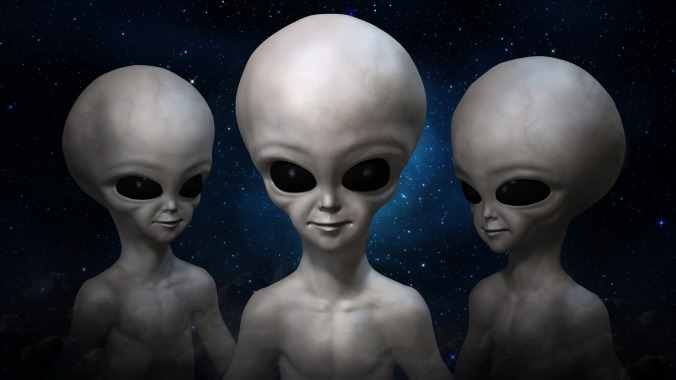Read this: The origins of our collective UFO obsession

We often feel it is our journalistic duty to regularly remind our readers that—somehow, some way—former Senate Majority Leader Harry Reid and Blink-182's Tom DeLonge are still potentially our best bets at solving the long-standing mystery of extraterrestrial visitation on our planet. And while Americans can rest easy knowing the duo still dedicate a substantial amount of time and energy trying to get to the bottom of this whole UFO business, some of you may occasionally wonder: How the hell did we get to this point? Well, uninformed sheeple, you’re in luck!
Yesterday, Wired posted an excerpt from Sarah Scoles’ new book, They Are Already Here: UFO Culture and Why We See Saucers, detailing the origin story of our cultural fascination with little green men piloting flying saucers from Mars…or the Moon, or another galaxy, Planet X, or Nibiru, or etc. etc.
Turns out, the phrase “flying saucers” can be traced back to 1947, when a pilot named Kenneth Arnold allegedly noticed nine unidentified flying objects flying super-duper fast in formation between Mount Rainier and Mount Adams. Given Cold War fears over Soviets infiltrating the good ol’ US of A, it wasn’t long after Arnold reported it to local journalists that national outlets picked up the story, with the Chicago Sun soon using the headline “Supersonic Flying Saucers Sighted by Idaho Pilot.” This, incidentally, stuck better than flying “pancakes,” as Scoles at one point suggests.
The fascinating excerpt lays out an anthropological take on UFO sightings’ rise and sustainability, pointing out that, even given our lovely human habit of deep distrust and seeing connections that may not actually exist, the U.S. government hasn’t exactly responded in the best way to these phenomena over the years.
A genuine fear of Russian interference in American life, hyped through our own domestic misinformation and largely scoffed at by the powers-that-be? We dunno. Seems a little far-fetched…